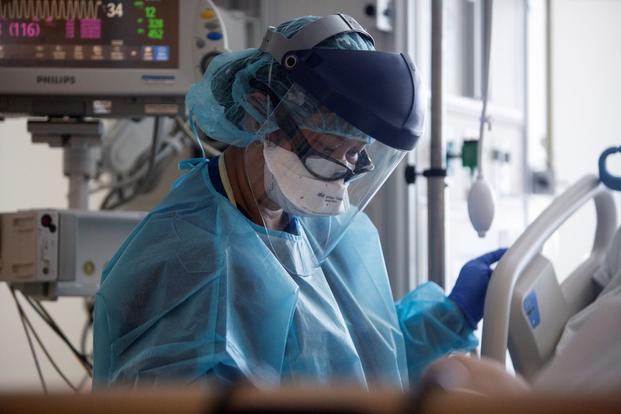U.S. military medical personnel or National Guard troops might assist in inoculating the public once a viable, safe vaccine is developed for COVID-19, senior government health officials said Friday.
Paul Mango, deputy chief of staff for policy at the Department of Health and Human Services, and Dr. Robert Redfield, director of the Centers for Disease Control and Prevention, said localities are currently developing how to vaccinate Americans when one becomes available.
Read Next: SecDef Throws Support Behind Medal of Honor for Fallen Iraq Hero Alwyn Cashe
The strategy could include using pharmacies as distribution points, or setting up mass inoculation centers and employing military support, they said.
“We are not going to take anything off of the table,” Redfield said in response to a reporter’s question during a press call Friday. “There is the potential for jurisdictions to want assistance from the National Guard or the military. The military is clearly providing a lead role in [the] logistics of all of this.”
Currently, more than 19,800 National Guard personnel are activated and supporting pandemic response across the U.S., according to Brig. Gen. Nick Ducich, vice director of the operations directorate for the National Guard Bureau.
They are engaged in supporting testing sites, distributing food and cleaning facilities, Ducich said.
Active-duty and Reserve military members also continue to treat civilian patients in coronavirus hotspots across the United States. About 740 military medical and administrative support personnel from the Army, Navy and Air Force were deployed to community medical centers in California and Texas to support coronavirus response as of Friday.
At the height of the nation’s pandemic response, more than 40,000 U.S. military personnel were deployed for COVID-19 operations, establishing temporary hospital facilities in New York City and elsewhere, manning Navy hospital ships and working in communities.
Currently, two vaccine candidates are in Phase III clinical trials – the step that proves effectiveness and rules out adverse reactions. According to Mango, nearly 30,000 volunteers have enrolled in the two trials, which require a total of 60,000 participants.
At the same time, the National Academies of Sciences, Engineering and Medicine and an advisory panel at CDC are evaluating the safety of vaccine candidates and developing recommendations on which populations will get the vaccine first and where they will be distributed, Redfield said.
The Defense Department announced earlier this month that it and HHS selected McKesson Corporation to serve as the central distributor for future COVID-19 vaccines and related supplies.
McKesson previously distributed vaccines during the 2009-2010 H1N1 influenza pandemic, according to Redfield.
HHS and DoD are coordinating the national vaccine initiative, known as Operation Warp Speed. Redfield said that in the weeks ahead, communities will begin rolling out their plans for distributing a vaccine, which he and Mango said could be approved before New Year’s Eve.
“We feel we are absolutely on track, if not a little bit ahead, in terms of our overall objective to have tens of millions of safe, effective vaccines approved before the calendar year ends,” Mango said.
-- Patricia Kime can be reached at Patricia.Kime@Monster.com. Follow her on Twitter @patriciakime.
Related: U.S. Troops May Not Get Priority for a COVID-19 Vaccine After All













